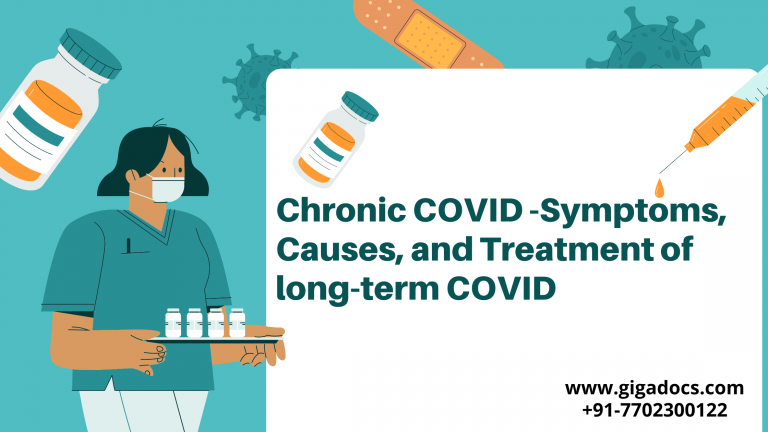For most people, moderate to mild Covid lasts roughly two weeks. However, health risks may persist even after they have recovered from the severe stage of the pandemic.
After being infected with Covid-19, recovered individuals can experience a wide range of new, returning, or persistent health problems for varying durations of time, ranging from three to nine months.
| Do you Know? After -Covid medical conditions are also known as- Post-Acute Covid-19Long Term CovidChronic Covid Long Haul Covid |
Common Symptoms of Long COVID
Various studies have analyzed multiple symptoms behind chronic Covid. According to the University College London (UCL), people with long Covid may experience over 200 symptoms that can involve over ten organ systems and affect one’s daily way of working. These symptoms may include-
- Shortness of breath
- Cognitive dysfunction- Brain fog
- Fatigue
- Chest pain
- Trouble speaking
- Anxiety
- Depression
- Muscle aches
- Fever and Chills
- Loss of taste and smell
- Pounding Heart accompanied with palpitations
- Dizziness on standing (lightheadedness)
- Rash
- Mood changes
- Changes in period cycles
- Hallucinations
- Insomnia
- Hearing and vision changes
- Severe hair loss
- Short-term memory loss
- Gastro-intestinal and bladder problems
- Skin conditions
Chronic COVID and Multiorgan Effects
A few individuals who have had severe Covid-19 sickness have experienced multiorgan effects or autoimmune illnesses over a more extended period, with symptoms lasting weeks or months. Most, if not all systems, including the heart, lungs, kidneys, skin, and brain, can be affected by multiorgan effects.
Autoimmune conditions occur when a person’s immune system attacks the healthy cells, leading to tissue damage and inflammation.
Although Covid-19 is primarily a lung disease, it can also cause serious injury to other organs like the brain, liver, and heart. Eventually, organ damage can expedite the progression of long-term illnesses. To begin with, chronic Covid-19 may impact the following organs:
- Heart- SARS-CoV-2 infection can cause cardiac problems, including inflammation of the heart tissue. In fact, one study found that 60% of persons who recovered from Covid-19 had indicators of chronic heart inflammation, which may cause shortness of breath, palpitations, and a fast heartbeat. Even individuals who had a minor case of Covid-19 but had no medical conditions before being sick showed signs of inflammation.
- Lungs- A severe case of Covid-19 can cause scarring and other long-term damage in the lungs. However, even minor Covid infection can cause persistent breathing problems, with even light activity causing you to become breathless. Although after Covid-19, lung recovery is possible, it takes a while. Breathing exercises and lung therapies can help.
- Brain- Even in young adults, Covid-19 can induce strokes, seizures, and Guillain-Barre syndrome, a condition that causes temporary paralysis. Covid-19 has also been associated with a higher risk of Parkinson’s and Neurodegenerative disorders.
Blood Clots and Thrombosis
Covid can cause blood cells to stick together and form clots, leading to thrombosis in the long run. While big clots can cause heart attacks and strokes, microscopic clots that obstruct tiny blood arteries (capillaries) in the heart muscle can be the source of heart damage done by long-term Covid.
The lungs, legs, liver, and kidneys are among the other organs damaged by blood clots. Covid can also weaken blood arteries and cause them to tear, resulting in possible long-term liver and renal disorders.
Diabetes after COVID-19
Covid and diabetes, particularly type 2 diabetes, have a complicated association. Type 2 diabetes is a risk factor for severe Covid-19 cases, and some Covid-19 survivors appear to be developing type 2 diabetes symptoms after they recover.
Long-haul COVID and Mental Health
Following treatment in the intensive care unit for Covid-19, some people experience lingering anxiety, despair, or post-traumatic stress disorder (PTSD). Long periods of quarantine, distress from job loss, financial troubles, grief from loved ones’ deaths, and the loss of health can exacerbate physical changes like joint ache and fatigue.
Causes of Long COVID
According to multiple different research’s, Covid infection may make some people’s immune systems overreact, causing them to fight the virus and subsequently attack the body’s healthy organs and tissues after they have recovered from the pandemic. An autoimmune condition is something that people with exceptionally high immune responses can experience.
Few long Covid signs, such as brain fog and a loss of smell and taste, could be explained by the serious long-term damage caused by the virus, whilst injury to blood vessels, in particular, could lead to long-term heart, lung, and brain disorders.
How common is Long COVID?
Long Covid symptoms are prevalent among those infected by severe Covid and ultimately ended up in the hospital, although not all of them. Long Covid can even affect those who had just minor Covid symptoms.
According to multiple research sources, acute long Covid may get more common as people age. It is two times more common in women.
COVID Vaccination
Make efforts to stay away from Covid at the first instance; this goes a long way to protect yourself from the dangerous after-effects of this deadly pandemic. Protecting yourself from Covid demands the use of face masks, social distancing, and handwashing with an alcohol-based handwash. Covid vaccination lowers hospitalization and pandemic-induced mortality rates. Thus, those who are eligible for Covid vaccines must have their jabs.
Treatments for Long Covid
Any patient or individual who experiences a Covid condition must seek medical attention. The care should involve consultations with a general physician as well as from rehab and mental health specialists. Breathing exercise, physical therapy, and regular exercises can all help relieve stress. However, Covid recovered people must expect a slow recovery from persisting chronic long-term Covid.
Seeing a Doctor on Gigadocs for Long Covid
Don’t dismiss the loss of scent, stress, worry, or insomnia as insignificant instances. Any symptom that interferes with your everyday living should be brought to your doctor’s attention, who can assist you in addressing these issues and improving your overall well-being.
Consult a specialist on the Gigadocs app if you have sudden chest pain, trouble breathing, insomnia, or other signs of long Covid, as discussed in this blog.
Book your consultation with the best doctors, read healthcare tips, collect points and redeem them for exciting healthcare offers only on the Gigadocs app.
Download the Gigadocs app from-
- IOS App – apple.co/2W2iG4V
- Android App – bit.ly/33AQoRC
To schedule a demo e-mail, at info@gigadocs.com




